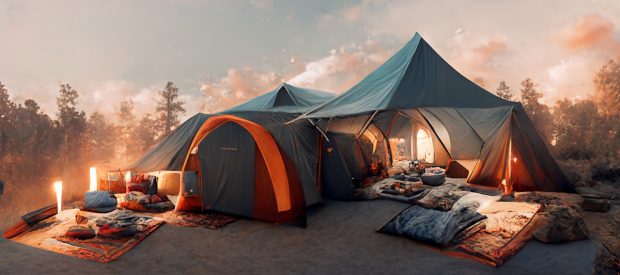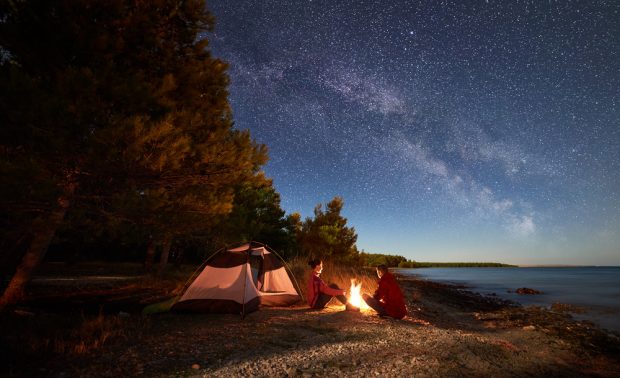4 Tips To Sleep Better During Your Camping Trip
Camping is a wonderful opportunity to break from your daily routine and activities to be closer to nature. However, that doesn’t mean you should sacrifice the quality of your sleep during your camping trip. In fact, your sleep when camping should even be better than sleeping at home. This is because when camping, your body strains to accomplish different activities, meaning your muscles desperately need rest and repair.

Your mental energy will likely be drained after focusing on different camping activities like hiking, clearing bushes to set up a camping site, or performing other endurance challenges. All these activities block your mind from daily thoughts that keep you awake, meaning you’re likely to enjoy your sleep more than ever. However, this isn’t always the case, especially for people who have never slept outdoors. If that’s the case, the tips below will help you sleep well during your camping trip.
1.Find A Good Location For Your Tent
The campsite you choose will be your home during the camping trip. Find a suitable location to set up your tent or insulated yurt. Research the surroundings to avoid setting your tent near trails, water bodies, or other risky areas. Knowing your surroundings helps reduce disturbances that could interfere with your sleep, like noise or excess light. For safety purposes, refrain from setting your camping site under cliffs, trees, or high areas to avoid nasty falls at night.
As a thumb rule, choose a soft, flat, and dry ground free of stones and other sharp objects that could harm you in your sleep. For safety, add layers of grass or leaves and lay a sheet over to separate you from harsh elements on the ground. If the ground is a bit sloppy but makes a good camping site, position your tent so your head sits in an uphill direction to avoid a headrush.
2. Have The Right Sleeping Gear
Whether you’re backpacking or camping, the right sleeping gear will increase your chances of having quality sleep. The first and most important gear is the sleeping bag. The right sleeping bag ensures you sleep warmer and more comfortably after your day’s sporting activities during the camping trip. Sleeping bags are of two designs: Backpacking and car-camping sleeping bags.
Backpack sleeping bags are lightweight, making them easy to carry for long distances when camping. They’re designed with a hood and hug your body, leaving no space that would need to be warmed by your body. They’re also filled with down, which enables them to retain heat. For this reason, they’re suitable for camping in cold areas.
Car-camping sleeping bags are rectangular and can completely unzip to resemble a blanket. They don’t retain heat like backpacking sleeping bags, meaning they’re suitable for camping in warm regions. Another sleeping gear is a sleeping pad which provides padding and thermal insulation when camping. Furthermore, you can bring one of your home pillows to ensure you sleep comfortably. Earplugs are also relevant to reduce noises from the bushes or snoring campmates.

3. Regulate Your Sleeping Temperature
Too much cold or warmth can disrupt the quality of your sleep. Fortunately, there are a few tips that can help with this. If it’s too hot, take a cold shower before bed and cover yourself with a light sheet. Also, slightly open your tent to allow air circulation in the tent.
If it’s cold, consider warming your space with a warm water bottle and stuff some clothes in the space in your sleeping bag. Remember to wear warm socks and a cape to help retain your body heat.
You can also warm up your body with a few light exercises such as press-ups, jumping jacks, or sit-ups. But avoid overdoing the exercises as they can raise your adrenaline and interfere with your sleep. Furthermore, avoid sleeping in damp clothes that you were wearing during the day. Wet clothes will make you uncomfortable and drain your body heat. Instead, have warm clothes that are exclusively set for sleeping.
4. Stick To Your Sleeping Routine
As much as it’s tempting to share stories with your campmates throughout the night, it’s essential to stick to your sleeping schedule if you want to enjoy the rest of your camping period. Ensure you do the same activities you do at home before going to bed. This may include taking a shower, brushing your teeth, reading a book, or going for a short walk. Following the same routine signals your body that it’s time to power down, ensuring you fall and stay asleep throughout the night.
Conclusion
Camping shouldn’t be a rough activity as many people think. It should be a comfortable adventure that doesn’t deter you from getting quality sleep at night. We hope the above tips will improve your camping experience by ensuring you get quality sleep while camping.
